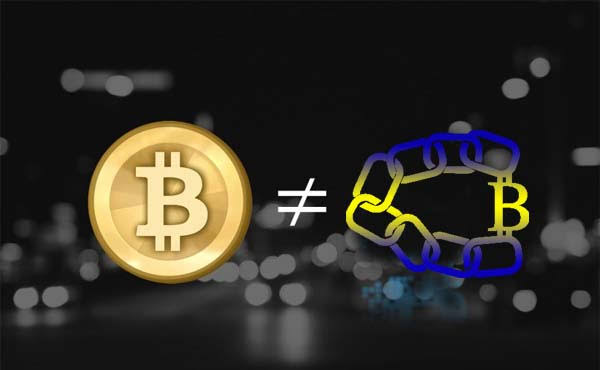For laymen, the world of cryptocurrencies and blockchain can be

For laymen, the world of cryptocurrencies and blockchain can be a rather confusing one. The lack of awareness and understanding of these technologies can breed an unwillingness to explore them. Many of them might have even wondered, “Is Bitcoin the same as blockchain?” To answer it in one go: “No it is not.” Having said that, it is not difficult to understand the root of this confusion. After all, blockchain technology had made its first appearance in the world hand-in-hand with Satoshi Nakamoto’s Bitcoin (BTC) in 2008. However, blockchain eventually far surpassed Bitcoin in functionalities and took many different forms beyond the Bitcoin blockchain.
What is Bitcoin?
Bitcoin is a form of electronic or digital currency that is created and given to miners as rewards for a process known as mining, where the miners commit a great amount of hardware resources and time to solve cryptographic problems to mine blocks of the Bitcoin cryptocurrency or BTC. BTC is fueled by the Bitcoin blockchain that has a Proof Of Work Algorithm, allowing transactions to be validated by those who invest the most amount of hardware resources to the process. This method makes it reliable but also slightly slow vis-a-vis other crypto coins because the Bitcoin blockchain takes around 10 minutes per transaction.
What is Blockchain?
Blockchain is a distributed ledger recording transactions (and other forms of data) in blocks having unique hash values. Each block bears its own hash value and the value of the preceding one. This creates a chain pattern that is extremely difficult, if not impossible, to break. This ledger is decentralized because validating transactions is done unanimously by members according to set criteria (depending on what consensus algorithm it has) the blockchain network has. Once a record is updated, all member computers can simultaneously view the changes. It is immutable and largely transparent. While blockchain started out as a ledger to record Bitcoin transactions, it has now diversified greatly to accommodate a host of other use cases: ranging from use of blockchain in healthcare to blockchain in supply chain management .
Differences between the Two
1. Nature:
The most obvious difference is that while BTC is a digital currency, blockchain is a digital ledger or database. Their very natures are different as bitcoin is used to facilitate transactions and blockchain is used to record transactions and more.
2. Objective:
BTC is meant to make transactions using this cryptocurrency speedy and efficient without requiring government involvement. Blockchain, on the other hand, makes it convenient to execute peer-to-peer transactions, without needing middlemen, in a great degree of fields, ranging from mobility to tech.
3. Trading Status:
BTC can be traded and used only as a form of virtual money, as a digital CURRENCY. Blockchain can be used to transfer currencies like that but also much more than just that. It can even transfer other assets such as bonds or property rights.
4. Flexibility:
Bitcoin is less flexible and is focusing mainly on making BTC transactions processed and validated faster. Blockchain, on the other hand, is an extremely flexible and versatile technology because it can be moulded to suit a vast number of use cases.
5. Scope:
As must be very clear from the above discussion, blockchain has a much broader scope as compared to Bitcoin.
6. Transparency:
Since Bitcoin transactions are recorded with a focus on anonymity, the transparency can sometimes be compromised, leading to misuse (for example, by the dark web marketplaces SilkRoute and AlphaBay). Blockchain technology is far more transparent and often adheres to KYC norms as businesses implement the technology to serve their needs.

